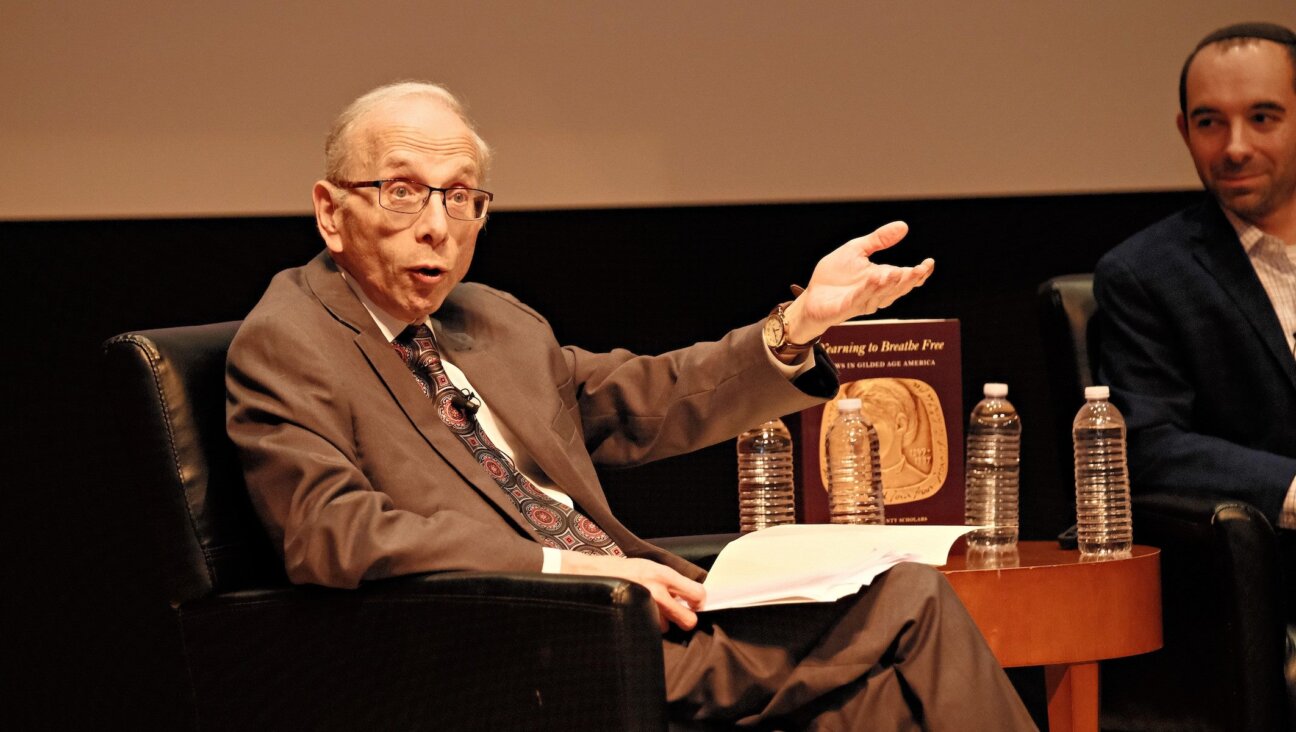My Orthodox friend hasn’t kissed his fiancee. But I have.

Image by Liana finck
From its start in 1906, A Bintel Brief was a pillar of the Forward, helping generations of Jewish immigrants learn how to be American. Now our columnists are helping people navigate the complexities of being Jewish in 2020. Send questions to [email protected].

Image by Liana finck
Falsely accused
Dear Bintel,
There is only one kosher butcher in my town, and I have been a customer for years. A few months ago, the butcher accused me of stealing a brisket and insisted that I pay for it again. It’s important to me to keep kosher but I don’t appreciate being called a liar. What should I do?
Signed,
The Mistaken Thief
Dear Mistaken,
I certainly understand why being forced to double-pay for a brisket rankles. But I don’t think you should literally stop keeping kosher because the butcher called you a liar! That sort of drama sounds more appropriate to a 1920s Yiddish short story.
I have to ask: What is the butcher accusing you of doing, exactly? Sneaking several pounds of meat out of the store under your shirt? Breaking in after hours? Ordering delivery and then snatching the brisket from the driver’s hand? I’m trying to assess whether this is a scenario where the butcher plausibly did think you stole a brisket, and therefore some direct communication might clear things up. Because if you have been a customer for years at the one kosher butcher in town, I imagine there is more context than what you have provided. Does the butcher hold a grudge against you for something?
Could you approach the butcher and say something gracious, such as: As you know, it was very painful for me to be accused of being a thief, and treated as if my word could not be honored. I know you feel differently. But as this is a small Jewish community, it is important for me to be on good terms with everyone. So let’s move forward. If the butcher protests, or accuses you again, you can say: I don’t want to discuss the matter further, but I do want us to move on.
Sometimes, when you’ve been accused of something unseemly, the best response is to act with so much dignity that everyone around you becomes more embarrassed for your accuser than you.

Seder cartoon Image by Liana finck
Kiss and tell…
Dear Bintel,
In college, I dated a woman who I liked well enough, but who broke it off when she met someone she liked better. I wasn’t heart-broken, but it was sad, though we stayed friends and I have no bad feelings towards her.
A few years ago, she moved to the area where I live, and I invited her to my birthday party to help her meet people. One of those people was a close childhood friend; they started dating, and recently got engaged. They seem very well-suited, and very happy, and I am excited for them, of course.
The problem is, this friend is very Orthodox, and I know that they haven’t so much as kissed (or maybe just about done that). She was definitely into her Judaism when we were in college, but not so religious when we dated and we were definitely sleeping together.
The thing is, she was terrible at sex. I think one of the reasons our relationship soured was because she would show no physical affection, and barely seemed to respond to me when I made overtures. It was really strange, and I even wondered at the time if she was attracted to men at all. When I would ask her about it, she would brush it off or say she had always been that way.
I was always worried that I was being too pushy, but she would say she wanted to do stuff but just wasn’t responsive, and blamed me, saying I clearly watched too much porn if I wanted her to moan and react like a drama queen. I definitely know the difference between fake, over-the-top porn stuff and normal excitement and enthusiasm about sex! Trust me, her lack of interest was stark.
My friend knows, of course, that I dated his fiancé in college, but we never discussed the details, and certainly never the sex. Now I’m worried he is being set up for a lifetime of sexual misery. Should I say something? I can’t imagine how to say something, but I feel guilty keeping this to myself.
Signed,
Troubled Best Man
Dear Best Man,
You dated this woman many years ago, and you yourself acknowledge you were an ill-suited match. Every couple has their own physical chemistry. There is no reason to assume that just because the sex you experienced with her was bad, it will be bad for them as a couple. They clearly get along better as a couple than you two did — likely their physical life will also be better.
I would recommend you not speak to your friend, at least not without some indication he would welcome the conversation. You would be giving him an image of her sexuality based on your impression instead of allowing him to form his own, and that’s not fair to them as a couple.
If you are very close friends, if you are truly his Best Man, you might ask more generally about how he is feeling about the upcoming major change in his life, sex and otherwise. Just because those sorts of conversations haven’t been part of your friendship so far doesn’t mean they must remain off-limits. You can also check in with him after the marriage to hear if there are issues or concerns, and if it sounds like something is up, then talk broadly about resources for couples that struggle with intimacy.
I say that just because some women DO struggle with desire and arousal, and they don’t realize they can get help. Sometimes it’s a physical issue, like a hormonal imbalance, and sometimes it’s about connecting to a certain thing that turns them on, but this is a serious issue and one with many solutions.
But to speak with him now about your experience would be to pre-define his relationship with his wife based on a lackluster college hook-up she had many years ago, and that is not something you should do.
Risk tolerances

Image by Liana finck
Dear Bintel,
My family usually gets together for Friday night shabbat dinner. During the pandemic, we’ve been meeting by Zoom, but it’s not the same. We recently suggested meeting in our backyard for a socially distanced dinner.
My parents like the idea, but my sister and brother-in-law aren’t comfortable with it. Should we move forward without the whole group? My parents want everyone to feel included.
Signed,
The Gang’s Not All Here
Dear Gang,
I say move forward. The last thing we would want is for you to be staring at your laptop next Friday night, resenting your sister for preventing you from a nice, socially distant Shabbat dinner. Nobody is at fault here. But who knows when social distancing will end? We might as well start making these sorts of uncomfortable compromises now, rather than in three months when it’s too cold to sit outside.
Any chance you can do some sort of hybrid? For example, you could host your parents, but before the actual meal maybe Zoom in the sister and brother-in-law for shalom aleichem, hamotzi, and kiddush. Maybe go around, Zoom participants included, and say one hope for the week before signing off. Some ritual like that, if it’s in line with your family vibe, might make them feel less left out.
And if you can, present the decision in as loving, nonchalant, blame-free a way as possible, such as, Rats! I totally understand why you feel that way. I think we are comfortable with mom and dad coming over, and they seem to be too. So we’re going to try it this weekend. Hopefully we’ll all be able to meet up soon, and if there is anything we could do in the coming weeks that might make you guys feel more comfortable coming over, of course let me know. Happy for all sorts of conversations!
The trick is to make it clear you are willing to be somewhat inconvenienced by them, and entertain the sort of nitpicky details that in prior years would be considered rude or micro-managing. For example, maybe they would be O.K. with an in-person dinner if everyone wore face shields, or took a temperature check, or something else. Or maybe not. But don’t make them feel bad or judged for not coming, and try to be light-hearted about it, as if they lived too far away to visit. No reason to make it a whole thing. It’s hard for everyone to know where to draw the line, and the less we police one another (within reason!), the better for all families.
But have your parents over. And it’s lovely your family is so close.
Shira Telushkin is a writer based in Brooklyn. Got a question? Send it to [email protected].























